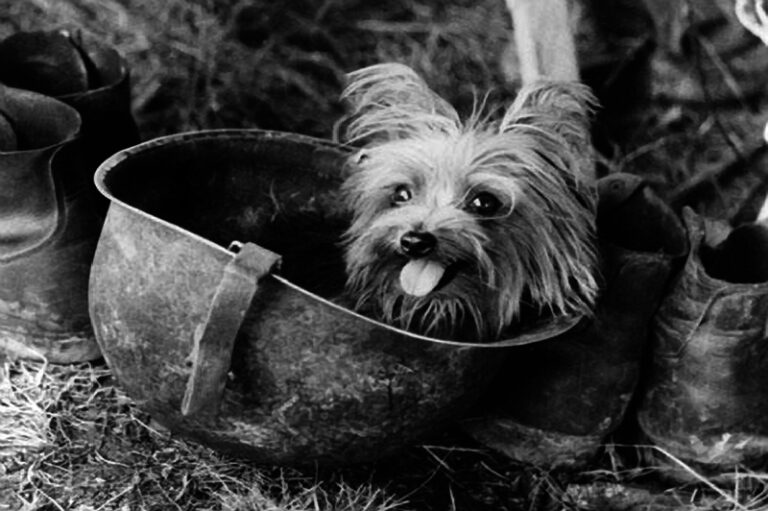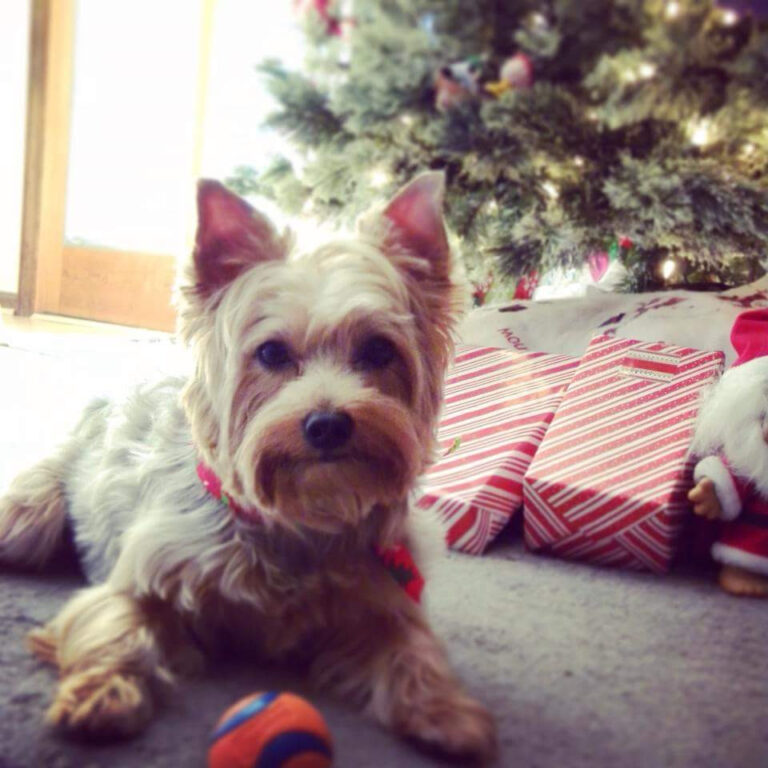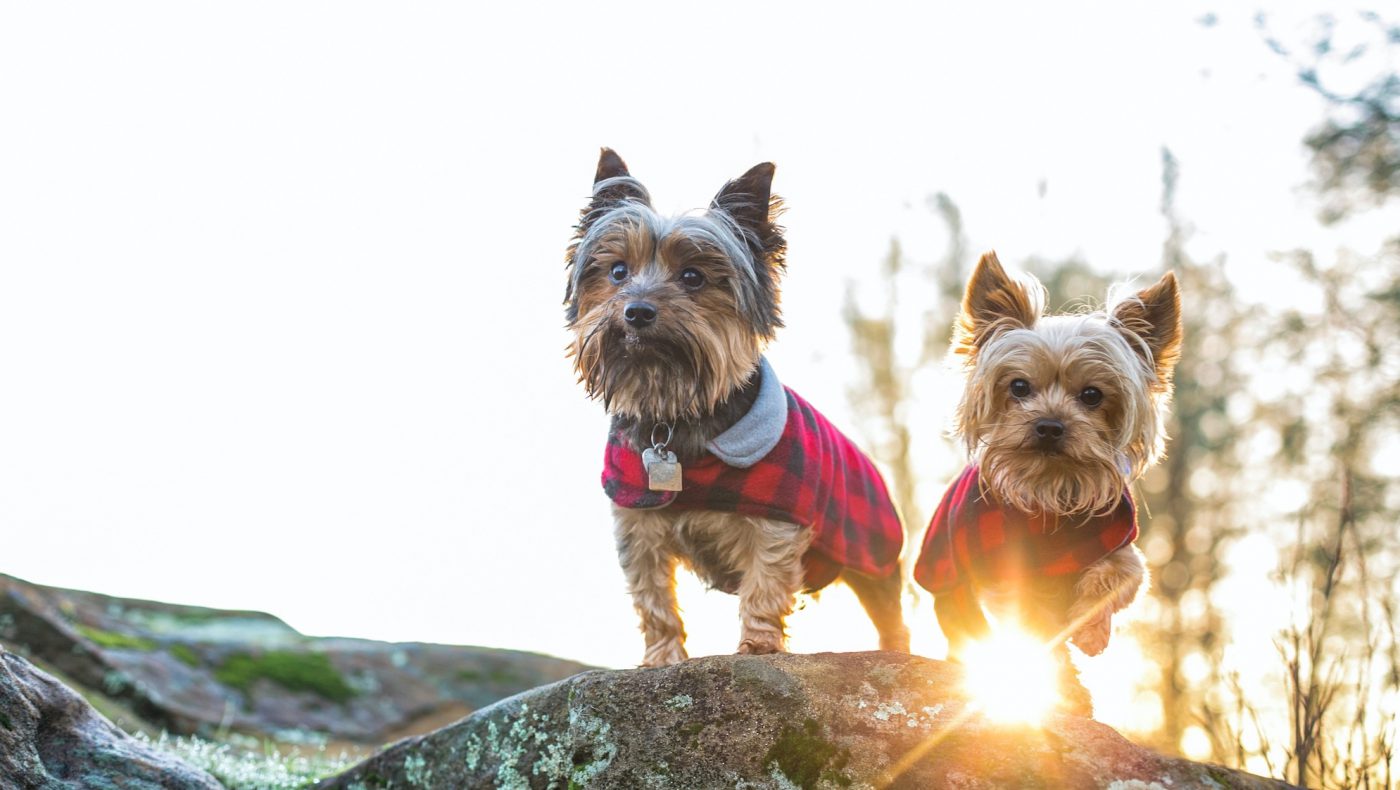Feisty. Fierce. Affectionate. The Yorkshire terrier packs a lot of personality into a compact frame. Their petite stature, and frankly adorable little faces, make Yorkies look like the quintessential lap dog. But while they do love a lap, these little dogs are nothing less than bold terriers. Their energy and attitude can make them wonderful, active companions—for someone willing to devote time to training.
Basic Yorkshire terrier breed facts
As the name implies, the Yorkshire terrier is a terrier, but is considered part of the American Kennel Club “Toy” group. These diminutive dogs tend to be seven to eight inches tall and weigh about four to seven pounds when fully grown.
The Yorkie’s distinctive coat (sometimes worn floor-length, and often gathered into a top-knot ponytail) is more like human hair than dog fur. It also changes as the dog grows—Yorkie puppies are black and tan when they are very young, and as they mature, their coat takes on that steel-blue and gold color.
Yorkies are single-coated which means they don’t have an undercoat (and that they benefit from a jacket in cold weather). The Yorkie’s hair coat also means they are low-allergen and have a low tendency to shed (though no dog is completely “hypoallergenic;” read more about that term and about hypoallergenic dog breeds here.) That beautiful coat does take regular work to maintain—daily brushing is recommended, with professional grooming every six to eight weeks. Many Yorkie experts and owners suggest keeping them in a shorter, lower-maintenance “puppy cut.”

I mean…
Like many other small breeds, Yorkshire terriers have a relatively long lifespan. Yorkies generally have a life expectancy of 11-15 years. With that long lifespan it’s important to make plans for a long-term commitment before bringing a Yorkie home and make sure that you will be able to provide for them over their lifetime.
The Yorkie personality profile
Glorious hair and pointy ears aside, a Yorkie is more than a pretty face. Yorkies were first bred to hunt, and that fearless nature is still part of the breed’s personality today (they’re affectionately known as the “tomboy toy,” a reflection of their working-dog background).
Yorkies are typically called confident, bold, and headstrong—they’re the classic big-dog-in-a-small-body. They thrive on attention and activity and won’t be happy being toted everywhere. “If you think Yorkies are small dogs that love to be carried around in designer purses, you are only half right!” says Bonnie Hensel of Save A Yorkie Rescue. Yes, Yorkies are small, but they are active, spirited and enjoy long walks where they can exercise those little legs rather than being tucked in a bag.
While every dog is different, Yorkies are generally known to be difficult to house train, and Hensel affirms that this process can indeed be “challenging for first-time dog owners and certainly not for the faint of heart.”

Franklin
Yorkies are intelligent and busy dogs that need appropriate outlets for all that energy which can be daunting if you’re looking for a quiet companion or aren’t experienced with dogs (“Remember they are terriers!” Hensel says).
“Yorkies are a stubborn breed,” affirms Yorkie owner John Reuter, dad to Rylee. “You have to have patience.”
If you have your heart set on a Yorkie be sure to devote ample time to training your tiny terrier to be happy, balanced, and respectful of all family members (more about that below). Another solid option would be to consider adopting a Yorkie mixed breed, which can deliver all the Yorkie charm with (potentially) fewer Yorkie challenges.
“Franklin works wonders with my mother-in-law who has dementia, but remembers and looks forward to his visits. He always uplifts her mood and looks her in the eye, allowing her to live in his tail-wagging world.” Martha Chaconas, owner of Yorkie mix, Franklin
Yorkshire terrier breed history
The Yorkshire terrier was first developed in the 1800s in the United Kingdom. As the name implies, they originated in the county of Yorkshire. Historians believe that Yorkies were first created by Scottish weavers who migrated to England and bred different terrier breeds together to develop the uniquely small and fearless dog breed. The Yorkie was first and foremost developed in working communities as a working dog, small enough to fit into small cracks and corners of textile mills to hunt mice and other rodents. Yorkies also worked in the region’s coal mines to hunt rodents.
In 1886, the Yorkie became recognized by the English Kennel Club and began to rise in popularity. At this time the Yorkshire terrier began to transition from primarily a working dog to being a companion dog of the Victorian upper class. The breed was first recognized by the AKC in 1885.

Pound for pound, one of the most heroic dogs ever?
And no trip through Yorkie history would be complete without mentioning Smoky the war dog. Smoky was found in a foxhole during WWII and adopted and trained by Ohio native, Corporal Bill Wynne. Smoky is credited with saving the lives of 250 men during one mission by using her terrier skills to help set up an underground communications line. But Smoky went on to greater heights of valor, participating in 12 combat missions and then helping countless soldiers heal as one of the first therapy dogs. After the war, Smoky continued to tour hospitals. “She was just an instrument of love,” Wynne said of this little hero. Smoky died in 1957 at the age of 14.
Healthy lifestyles for Yorkies
Like many breeds, Yorkies thrive on lots of human affection and companionship and can be vocally unhappy if left alone for long periods of time. Training your Yorkie from a young age to spend time happily alone in their crate, and to observe boundaries, will help stave off separation anxiety later. But in general, Yorkies aren’t the best match for a home where people are out of the house for long periods of time and won’t be able to spend a fair amount of time with their dog.
Like other terriers, Yorkies can have a high prey drive. They were bred to chase and hunt, so, as Hensel notes, they must always be secured when outside of the home or in a fenced yard. While training your Yorkie, a great thing to focus on is recall–getting your dog to stop what they’re doing and pay attention, or come to you.

Rylee
With their small stature, Yorkies can be easily mishandled and hurt, so interaction with other dogs, children, and careless adults should be supervised to avoid accidental injury.
Many Yorkie owners report that their little dogs don’t act so little around other dogs, especially much bigger dogs. It’s important to socialize Yorkies appropriately as puppies.
When it’s safe to do so, give Yorkies opportunities to explore the world in the same way that you would socialize a much larger dog to ensure they are well adjusted, comfortable, and confident in an array of places and around diverse people and animals. As part of this socialization, introduce them carefully to other well-balanced dogs. You’ll want to be cautious to supervise interactions around dogs, to ensure they aren’t accidentally injured with too-rough play. At the same time, it’s important not to coddle them—puppies and dogs can learn good manners from testing boundaries with other dogs.
Like Chihuahuas, Yorkies have, fairly or not, earned a rep for not being great with kids. These small dogs can be intolerant of children who may act erratically, and with their tiny frames, they are delicate and are easily injured by rough handling. Yorkies generally do best in adult homes, or homes with older children. But any dog, including a Yorkie, can be trained to live happily with kids. It’s essential that both dog and child are trained in appropriate interaction. If your kids are old enough to understand, teach them the proper way to pet and handle the dog. In turn, your Yorkie should be taught boundaries and not be allowed to indulge in improper behavior, like guarding food or being overprotective of a family member, just because they’re tiny and cute. All family members should play a role in feeding and caring for the dog.
Exercise is important for dogs of all sizes and as an energetic breed, Yorkies need ample daily exercise to live happy and healthy lives. Regular exercise will help to prevent some behavioral issues common in the breed such as excessive barking and destructive behaviors that can be a result of boredom, and can also help keep your Yorkie in good physical shape.

Nick in disguise
Training and behavior
Yorkies are scrappy dogs with outsized personalities and, like any dog, they can develop bad habits if they’re not sufficiently trained and provided with mental and physical stimulation. Unfortunately people sometimes assume small dogs don’t need the same level of training as big dogs and make the “cute excuse” for bossy, or barky behavior (both things that Yorkies are known for).
Yorkshire terriers thrive with consistent, balanced training. Some extra important training considerations for Yorkies are as follows:
Socialization: It’s tempting to coddle this adorably tiny dog, but babying your Yorkie too much can lead to an insecure dog who feels the need to lash out (and bark, and bark) at everything in their path. Again, expose your Yorkie, carefully, to all kinds of stimuli when they’re young, if possible. Take obedience classes—they’re great for training and socialization.
Exercise: Keep them active! Again, it’s easy to assume that Yorkies don’t need much exercise, but physical and mental stimulation are key. Make sure your healthy, adult Yorkie gets at least 30-45 minutes of walking and exercise per day, and ideally more! Play scent games, or teach them to play fetch. Yorkies can also be very successful at a variety of canine sports including agility, tricks, and rally obedience. Yorkies also excel at the sport of Barn Hunt where dogs search hay bale courses for rats (safely contained in plastic tubes), as well as being one of the breeds allowed to compete in Earth Dog, a sport created to simulate the “go to ground” work that terriers were first bred to do.
Bark management: Both socialization and exercise play a role in helping to manage your Yorkie’s natural inclination to bark. Exercise influences many dog behaviors, including barking—regular, and intense, exercise has been shown to reduce fear in dogs; it can help lower stress, frustration, and boredom which contribute to excess barking. Socialization and habituation will also reduce the incidence of your Yorkie barking to sound an alarm. It’s especially important with dogs like Yorkies to avoid inadvertently rewarding barking behavior with attention, like picking them up, or cuddling, or giving them toys. Bear in mind also that barking is a natural behavior—try to be patient as you work to reward the behavior you’re looking for, but avoid yelling or physically punishing your dog.
“We are inseparable and best friends and I don’t know how I would get through the day without him.” Max’s dad Richard Merlino
Breed-specific health concerns
There are some health and safety considerations to keep in mind in the home with very small dogs like Yorkies. They can be easily injured by jumping off of furniture, so doggy stairs or ramps to couches and beds can be a good idea.
Like many other small breeds of dogs, Yorkshire terriers are especially prone to dental disease, likely due to tooth crowding among other factors. In addition to needing daily tooth brushing, Yorkies should be seen by their veterinarian regularly—ideally once to twice per year—to monitor their dental health and have professional dental cleanings as needed. Without regular tooth brushing and dental cleanings, dental disease can lead to loss of teeth, and increases your dog’s risk for heart and metabolic diseases.
Yorkies are prone to conditions including the following:
Microvascular Dysplasia (MVD: This is an abnormality of the blood vessels in the liver common in small dogs and especially in Yorkshire and Cairn terriers.
Portosystemic Shunts (PSS): Dogs with MVD may also have portosystemic shunts, or liver shunts, which occur when the blood vessels don’t communicate properly with the liver, so blood from the gastrointestinal system flows through the body, bypassing the liver, causing a buildup of ammonia and other harmful toxins. Some dogs don’t show any signs of this ailment until they’re well into adulthood. Some puppies exhibit “failure to thrive,” or seem smaller and weaker than normal. Dogs may also show a loss of appetite or bouts of vomiting and diarrhea.
Protein-Losing Enteropathy (PLE): A category of serious, chronic intestinal disease that may manifest as severe weight loss, diarrhea, and accumulation of fluid in the abdomen.
Encephalitis: Signs of encephalitis or brain inflammation, may include difficulty walking, lethargy, excessive head-tilting, seizures, and changes in vision.
Degenerative Myelopathy (DM): This neurological disease is considered the canine equivalent of amyotrophic lateral sclerosis (Lou Gehrig’s disease) in humans. Signs include muscle atrophy and loss of coordination.
Knee problems: Yorkies over-index for patellar luxation, or loose kneecaps. This can cause frequent dislocations and may result in arthritis. Many Yorkies can live normally with this condition. But if there is a traumatic event or over-exertion, they may develop severe and permanent patellar luxations, and need surgery to correct them. Issues like this are one reason it’s important to keep your Yorkie at their ideal weight.
Weight problems: Yorkies can be prone to obesity, which can in turn contribute to a range of other health problems. More on this below.
Many Yorkie owners also report that allergies, and eye problems are common.
Especially with their long life span, medical bills can be a common reason Yorkies are re-homed or placed in rescue. If you are considering adding a Yorkie to your family be sure to look into pet insurance or have a financial plan for handling ongoing and emergency medical bills.

Max
Feeding your Yorkie
As with any breed of dog it’s important to feed Yorkies healthy, balanced food on a regular schedule. Here are some additional considerations for feeding your tiny terrier:
Weight maintenance is key: Yorkies’ inclination to be overweight can lead to a variety of serious health conditions, including the knee problems to which they are also predisposed. One important way to prevent obesity is to simply get your Yorkie’s food portions right. Because the dogs themselves are so small, it only takes small fluctuations in meal size (differences you may not even notice by “eyeballing” the bowl) to show up in the form of extra pounds. For portion accuracy, it’s important to determine the precise number of daily calories they need. Signing up for a fresh-food plan tailored to your dog’s age, weight, activity level and other factors makes it easy to be precise about portions, and adapt as your dog changes. Keep an extra close eye on treats, too, which can really add up and contribute to weight gain and nutritional imbalance in a tiny dog.
Crunchy is not healthy for teeth: For dogs prone to dental disease, don’t look to a dried pellet to clean teeth. There’s an enduring myth that crunchy kibble helps clean teeth but it does no such thing. In fact, kibble is an ultra-processed food and as such can contain substances that actually fuel inflammation in the body, including in the tissues of the mouth. Most kibble is starchy, and full of fillers that break down to sugar, which contributes to plaque and bacteria. Eating for dental health means eating for overall health—a fresh, whole-food diet promotes a healthier immune system, which helps ward off dental infections (and it doesn’t stick to teeth!).
Keep it clean: Small bodies, especially bodies prone to liver conditions, don’t need the toxic load of highly processed food. Fresh food that’s made with human-grade meat and vegetables provides necessary moisture, and vital nutrients in a digestible form.
Keep it interesting: Yorkies are also known to be among the pickiest of eaters. Many Yorkie owners report that switching from dry kibble to a fresh diet makes mealtimes easier for everyone.
If you’re looking for pre-portioned, healthy meals, tailored to your Yorkie, a fresh-food plan might be right for you. A healthy diet alongside training, vet care, enrichment (and ample opportunity to chase many squeaky “mice”) are the keys to giving your Yorkshire terrier a fabulous, fulfilled life.
If a Yorkie sounds like a good fit for your life, consider adopting one from a local shelter or rescue. Save A Yorkie Rescue has been rescuing Yorkshire terriers since 2002 and is a great resource for anyone looking to adopt, volunteer or learn more about this bold breed.
What Yorkie owners say about fresh food

Nick
(After) The Farmer’s Dog, his coat has improved and his skin issues cleared. And although he will be 11 this year, his energy is through the roof. We just had our senior check-up and he passed with flying colors—our vet was amazed at how healthy he is for his age. And there’s no hint of slowing down—he walks 2-3 times a day. And he still has all his own teeth!” —Nick’s mom, Robin

Parker
“Before I got Parker on The Farmers Dog, he was a mess. He had issues with mucus-y bowel movements. You never knew when they would happen, but especially when he was around new people. Since I found The Farmers Dog, he hasn’t had any episodes of unsettling bowel movements. I am hooked and would never think of changing his diet! It truly is amazing!!” —Parker’s mom, Angela









